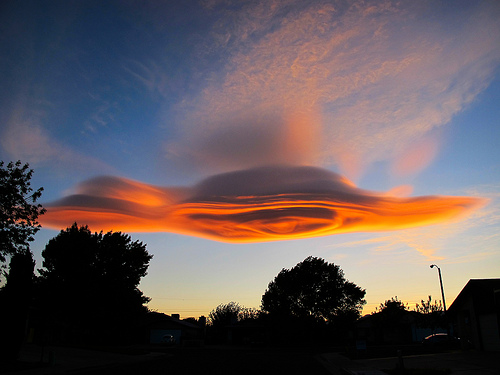On the outskirts of an isolated village in Southern China, surrounded by mountains, a woman meets a married schoolteacher for a tryst in a pasture, and during her dazed walk home finds a glowing stone. The sky parts, a dark form passes across the sun, and the woman falls down. Not many scenes later, the village has become a UFO theme park, transformed by American dollars and adorned with flags and sculptures. A marching band proclaims that it celebrates the future. The premise of Xiaolu Guo’s film UFO In Her Eyes sounds dystopian; arriving at the theater after two weeks in Beijing, I had to double-check the film’s program to confirm that it wasn’t a documentary.
In the film, based on her novel of the same name, Xiaolu Guo takes post-Mao China as her protagonist. The film satirizes both China’s embrace of commercialism and its government’s paranoia about the unknown or “sensitive.” Guo writes that Western audiences tend to either romanticize China or view it negatively because of Communism, and as a filmmaker she’s not interested in making “another conventional sleepy lazy Chinese film” that fulfills expectations about the countryside. Instead she creates fabulist narratives that ask universal questions about how “a small person tries to find a path for survival… amid a totalitarian society—it is the perpetual task of Sisyphus and his task can never be completed.”
An 80-foot tall, $32 million screen flashes videos to shoppers at a mall named The Place. A friend in her thirties remembers donkeys grazing there.
The people of Three-Headed Bird Village have few options for survival once modernity-enthusiast Chief Chang (Mandy Zhang) orders the village’s fields, trees and fishing holes bulldozed to make space for a new hotel, museum, and various other monuments to an alien invasion that may never have happened. Most villagers give in to the pageantry. After all, there are instruments to play and flags to wave. An inspirational speaker waves dollar bills, then shouts slogans about getting rich, and a magazine cover announces that Obama might sell the U.S. to China. Life gets more difficult for Kwok Yun (Shi Ke), the woman who found the glowing stone and whom Chang has awarded the title “model citizen.” Her new role in the village doesn’t suit her, and she begins seeking company with a mute migrant “potential subversive” who repairs bicycles.
Chief Chang’s cheerful recklessness drives the situation’s absurdity—the bigness, the shininess, the declarations, the lava lamps and delusions of grandeur, and most of the film’s jokes—but her love of the future also throws the older villagers’ loss into relief. Among the most memorable shots of the film are those of an old man’s downcast face. Juxtaposed with Chief Chang, he’s sobering. As I walked to see the film, a storm approached, winds picked up. All of us on the street cupped our hands or wrapped clothes over our faces to protect our eyes and mouths from debris whipping towards us from a nearby construction site. Later that night, across town, I stood beneath an eighty-foot tall, $32 million screen that flashes videos to shoppers at a mall named The Place. A friend in her thirties remembers donkeys grazing there. If China’s development seems fast to me, an American passing through for the summer, how must it seem to the older generation of Chinese?
No one, no matter how unimportant they seem, is immune from the big economic machine rolling over our lives.
Guo, now based in London, grew up in a small Chinese fishing village but wants to underscore that although China is the main character, the themes of the story are not particular to China. A good story resonates with anyone, she says, regardless of culture. We’re all taking part in the march toward homes where UFO landing pads have replaced water and dirt, and, Guo writes, “no one, no matter how unimportant they might seem, is immune from the big economic machine rolling over our lives.” The sense of powerlessness that often accompanies globalization appears across Guo’s work, but there’s nothing subtle about her critique here. She openly mocks the Chinese government and both the capitalism and Communism it holds so dear, making herself vulnerable to censure. But Guo says doing anything else would be pointless.
MOMA is hosting the US premiere of UFO In Her Eyes from June 13th to 18th.

